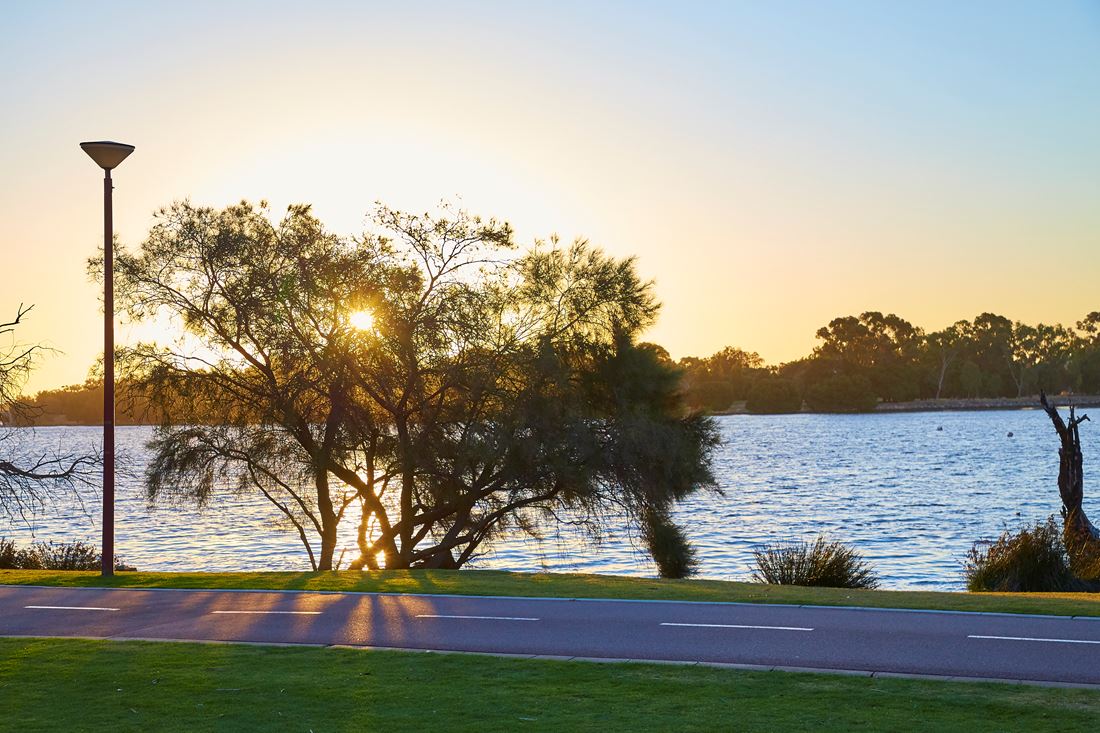
Environmental sustainability
Burswood Park Board maintains a strong commitment to our local environment.
Once an environmental wasteland, Burswood Park is now a Class C Reserve with 56 hectares of parks, gardens and heritage trails on the Swan River foreshore.
Before its transformation, the Park provided no sustainable wildlife habitats. Now, biological diversity is preserved and protected, and the parklands support an array of native fauna and flora, which are major drawcards for visitors.
Waste at Burswood Park
Burswood Park Board has a strong commitment to the protection and preservation of our environment, adopting a range of best practice waste management initiatives.
Clippings from the Park’s manicured grassed areas are returned to the surface to replace soil nutrients and reduce the need to use granular fertilisers. The majority of green waste from trees and shrubs is also processed on-site and the mulch used to top up garden beds, reducing weed growth, promoting and sustaining better plant growth, minimising moisture loss and providing warmth for plant root systems.
Nutrient levels in soils and plant material are regularly tested to ensure that chemicals, fertilisers and applications are applied at the right time of the year to reduce the chance of run-off.
As a public park located along the banks of the Swan River, we are also committed to reducing waste through litter. Whilst we strongly encourage our patrons to ‘pack, take and dispose’ of their picnic waste at home, we also provide 30 waste bins at various locations throughout the park. This includes 13 recycling waste bins, to ensure waste is reprocessed wherever possible.
In addition, Burswood Park Board is a collection point for Containers for Change.
Burswood Park’s maintenance teams also complete litter inspections several times a day within the Park, in particular along the river foreshore.
Sustainable grounds management
Specialist grounds maintenance teams are engaged at Burswood Park to ensure the parklands are preserved to a high standard and with exceptional safety management and sustainability. Our contractors operate under a 'Zero Harm' goal for staff and the natural environment in which they work and operate.
In practical terms at Burswood Park, this means that staff, park patrons and the natural environment are protected through careful risk assessment, planning and procedures before any work occurs within the park. A safety analysis is always completed, which details the tasks, hazards, controls and persons responsible, to ensure that the impact on our park patrons is always minimised.
Our teams also comply with specific regulations that apply to particular activities - for example, traffic and vehicle movements, the use of chainsaws, chemical and fuel use and other related works. Our staff and contractors operate under the requirements of all relevant Acts and Regulations including the Health (Pesticides) Regulations 2011, Occupational Health Safety and Welfare Act 1984, Occupational Health Safety and Welfare Regulations 1996, Parks and Reserves Act 1895 and the Road Traffic Act 1974.
Water management
Our lakes have been designed with minimal surface areas, in turn reducing water loss through evaporation, resulting in fewer bore water top-ups. Water quality is maintained by regularly dredging and removing organic build up in the bottom of the lakes that often create algae blooms and poor water quality.
We reduce the water we extract from underground reserves by harvesting surface run-off and collecting storm water, which is then pumped into the lakes. This assists with reducing the amount of water taken from below ground water reserves.
More broadly, we maintain and make improvements to our automatic irrigation system which ensures a more efficient delivery system that minimises water wastage and power use. A weather station that communicates with the automatic computerised irrigation system allows immediate changes to be made to the watering requirements of the park.
Swan River protection and enhancement
We proudly support the Swan and Canning river system restoration, rehabilitation and sustainability programs through an annual $3 million funding arrangement that supports healthy catchments, river health, riverbank rehabilitation and community engagement projects. Since its inception in 2009, the Board has proudly contributed a total of $33 million to this important program.